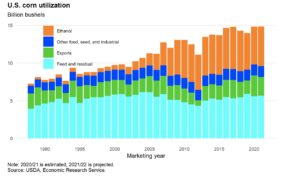House Agriculture Chair G.T. Thompson has tentatively scheduled a farm bill markup for the week of Feb. 23, according to three people familiar with the plans.
EPA Proposes Biofuel Blending Compliance Extension
Reuters writers Stephanie Kelly and Jarrett Renshaw reported this week that, “The U.S. Environmental Protection Agency on Thursday proposed giving oil refiners more time to prove compliance with the nation’s 2020 and 2021 biofuel blending mandates.
“The move comes as the EPA considers industry requests to soften the mandates as the coronavirus pandemic has crushed overall fuel demand.

“Several oil refiners have slowed or stopped buying compliance credits in a bet the EPA would ease the requirements, putting them at risk of hundreds of millions of dollars in liabilities if the agency decides against them.”
EPA is again kicking the can down the road on biofuel blend deadlines at the request of Big Oil /Biofuel industry needs certainty + these delays are a gut punch to Iowa farmers & rural communities
— ChuckGrassley (@ChuckGrassley) November 18, 2021
The Reuters article explained that, “Under the U.S. Renewable Fuel Standard oil refiners must blend billions of gallons of biofuels into their fuel mix each year, or buy the compliance credits – known as RINs – from those that do. RINs must typically be turned in to the EPA shortly after a compliance year ends.
“The EPA, however, has delayed decisions on 2021 blending obligations, and is expected to miss a deadline to finalize 2022 obligations by the end of the month.”
Once again, the EPA gives big oil a leg up with another extension from complying with the RFS. Disappointing, but not surprising given the string of broken promises from this administration. https://t.co/Pxfvf1DtvB
— Senator Deb Fischer (@SenatorFischer) November 18, 2021
And Timothy Eggert reported this week at FarmWeekNow Online that, “The agency said the extensions were necessary because of ‘continued delay in the promulgation of the 2021 RFS standards and uncertainty around EPA’s small refinery exemption (SRE) policy.'”
The FarmWeek article pointed out that, “Those delays were the subject of harsh criticism from federal lawmakers and biofuel industry representatives at a U.S. House Agriculture subcommittee hearing earlier in the week.
“Rep. Rodney Davis, R-Taylorville, said the delays and passive communication are contributing to speculation the Biden administration may reduce ethanol targets.”
#Corn Grind for #Ethanol.
— Farm Policy (@FarmPolicy) November 15, 2021
--Ag Outlook w/ Chad Hart, complete video: https://t.co/1WeNYeQwaT @AgDecisionMaker, @ISUANR. pic.twitter.com/zt4VgMwetS
DTN writer Todd Neeley reported on Thursday that, “In recent months the Biden administration reportedly was considering cuts to the RFS, as the EPA continues to look at where to set volumes following the 2020 COVID-19 economic shutdown that led to lower gasoline demand.
“The latest announcement provides no indication of when EPA will propose several outstanding volumes requirements. It isn’t the first time the ethanol industry has experienced RFS delays. The Obama administration delayed volume releases in both 2014 and 2015.
“The announcement was met with frustration from biofuels groups, many who had hoped the Biden administration’s approach to the RFS would be an improvement from the Trump EPA. The Trump EPA granted 88 small-refinery exemptions in four years.”





